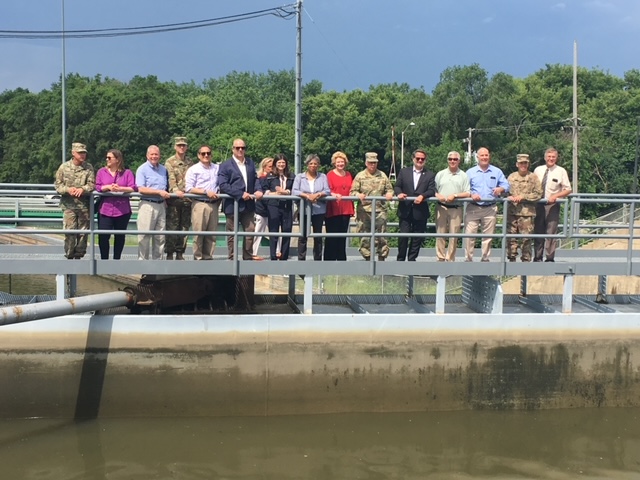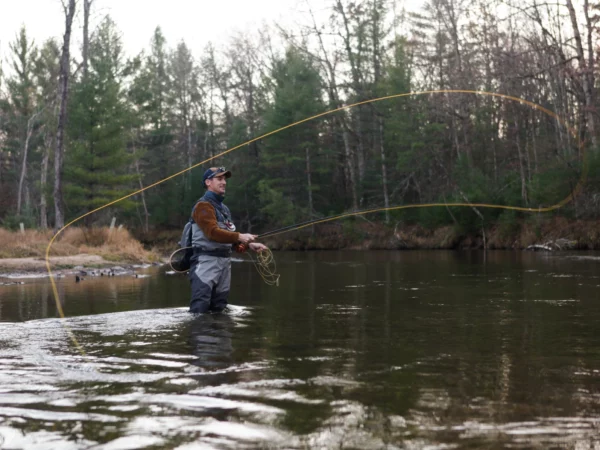
The first efforts to stop the advance of invasive carp to the Great Lakes began in the early 2000s when electrical barriers in the Chicago Area Waterway System leading to Lake Michigan were thought to be a deterrent.
The fear was that if the voracious carp entered the lake, they could expand their range, wipe out the food supply and eventually devastate the multi-billion dollar Great Lakes fishery. But no one knew if the barriers could be a permanent solution or simply a stopgap.
Fast forward two decades and extensive study of options and lobbying Washington for a permanent fix. The Army Corps of Engineers is now on the cusp of construction on modification of the Brandon Road Lock in the Des Plaines River, 27 miles southwest of Chicago and Lake Michigan. The Brandon Road site is “the only single location” that could address the carp advance, according to the Army Corps.
But there’s a glitch.
The project, originally estimated to cost $275 million is now projected to cost $1.1 billion. But the main sticking point is that it requires Illinois to sign an agreement as the non-federal sponsor that the state has so far refused to sign. The reluctance isn’t about funding. Illinois and Michigan combined have pledged $114 million, pending legislative approval, and that meets the state funding requirement. The other Great Lakes states have not made a financial commitment to the project to date.
The challenge is securing Illinois’ signature on a complex Project Partnership Agreement with the Army Corps that requires the state to assume responsibility for issues it is reluctant to take responsibility for.
That was the message from Loren Wobig, Illinois DNR’s director of water resources at the recent meeting of the Great Lakes Commission where invasive carp was on the agenda.
Among the issues of concern are a requirement that Illinois assume responsibility for any hazardous waste pollution at the site, which is unknown. And responsibility for the ongoing cost of operating the lock decades into the future. Plus, the project has environmental justice concerns for people who fish at the site for subsistence, Wobig said.
Illinois’ governor and attorney general have said no to taking responsibility for hazardous sites, according to Wobig. Illinois has also expressed concern about the complexity of property acquisition necessary for the project to advance and indemnification and hold harmless provisions of the agreement.
Army Corps spokesperson Allen Marshall did not address specific barriers to securing a partnership agreement. “As with any kind of negotiation, there are challenges to bringing about shared agreements. With this project, those challenges are increased due to the magnitude and complexity of the project,” Marshall told Great Lakes Now.
The Army Corps is working diligently with Illinois to get a signed partnership agreement, according to Marshall. Illinois’ Wobig said the state is also committed to the Brandon Road project but acknowledged that a time could come when a partnership agreement isn’t possible. Discussion between the Army Corps and Illinois is continuing.
Doubters
In 2009, a team of researchers taking samples in the Chicago Area Waterways System discovered environmental DNA from invasive carp. While not conclusive proof that invasive carp had breached the electric barrier, it suggested it was possible. The event set off alarm bells and a call to action in the region.
Cameron Davis was the Obama administration’s Great Lakes adviser to the EPA administrator and was involved with the initial response. He also worked with other agencies to develop longer term strategies. In February 2010, he testified before Congress about the “multi-tiered defense” to stop the carp’s advance. That defense included coordination of multiple state and federal agencies and recognizing that it was necessary to “fight biology” with more than an engineering defense, Davis said.
In December 2022, Great Lakes Now asked Davis if, given the success since 2010 in keeping invasive carp out of the Great Lakes, is the Brandon Road project a “must have” for the region, especially given its billion dollar price tag?
Davis did not comment on whether the project is a “must have.” “The multi-tiered defense approach we established in 2010 continues to work. Protections are in place to minimize the risk,” until the Brandon Road project is complete, Davis said.
Great Lakes Now also asked long-time Great Lakes policy expert Dave Dempsey last September if the billion dollar expenditure for the Brandon Road project made sense. Dempsey was a policy adviser during the Obama administration with the International Joint Commission, the U.S. and Canada agency that advises the countries on trans-border water issues.
“It doesn’t make sense,” Dempsey said, pointing out that “a prevention ethic is completely lacking in environmental protection. We don’t want to spend money until there is a problem staring us in the face.”
Dempsey said the invasive carp are likely coming to the Great Lakes and the question is whether they can establish themselves. “But I’d take that billion dollars and spend it on a lot of different things,” Dempsey said.
The Great Lakes Commission did not respond to a request to comment when asked if the Brandon Road project was a “must have” for the region. Army Corps spokesperson Marshall also did not respond to the question about the necessity of the Brandon Road project given the effectiveness of existing preventive measures and the billion dollar expense.
Assuming a timely resolution on the partnership agreement, the Army Corps estimates completion of the Brandon Road project between 2030 and 2032.
Catch more news at Great Lakes Now:
New Great Lakes book challenges readers with mystery, facts and whimsy
Former U.N. adviser warns on water futures trading, elevates water crisis to level of climate
Featured image: Michigan congressional delegation at the Brandon Road Lock, 2019. (Photo Credit: Gary Wilson)




